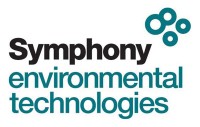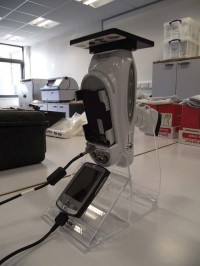 Symphony Environmental, the environmental technology company, claims to have the answer to two pressing problems related to modern plastic materials – first, plastic accumulates in the open environment as litter for decades after its useful life, and second, plastic objects touched by multiple users are a factor in the spread of microbial infection.
Symphony Environmental, the environmental technology company, claims to have the answer to two pressing problems related to modern plastic materials – first, plastic accumulates in the open environment as litter for decades after its useful life, and second, plastic objects touched by multiple users are a factor in the spread of microbial infection.
d2w, Symphony Environmental’s controlled-life plastic technology, is an intelligent additive that adds value to the commercial user’s product and brand by showing practical concern for the environment. d2w turns ordinary plastic at the end of its useful life into a biodegradable material, and can be used for a wide range of plastic products made from Polyethylene(PE), Polypropylene(PP) or Polystyrene (PS), including single, multi layered and laminated materials, and including virgin, recycled or blends of these polymers.
Symphony also offers d2p, an anti-microbial product which stops bacterial growth and can be added to all kinds of plastic items, from the gloves used at deli counters, to the handles on shopping baskets and trolleys, and even door handles and toilet facilities.
Michael Laurier, Symphony Environmental’s Chief Executive, spoke to The Grocery Trader.
The Grocery Trader – First of all, Michael, can you tell us about Symphony Environmental as a company?
 Symphony Environmental Technologies Plc is a British-based public company listed on the AIM market of the London Stock Exchange. Our HQ is in Borehamwood, just north of London. We have labs there, and in Great Yarmouth and Telford, where we develop the scientific base of our products. We manufacture our additives in the UK, USA, Germany and the Far East, and we generate most of our revenue abroad, making us a major export earner for Britain. We employ 35 people in the UK, and approximately 500 through our distributors working in more than 90 countries worldwide.
Symphony Environmental Technologies Plc is a British-based public company listed on the AIM market of the London Stock Exchange. Our HQ is in Borehamwood, just north of London. We have labs there, and in Great Yarmouth and Telford, where we develop the scientific base of our products. We manufacture our additives in the UK, USA, Germany and the Far East, and we generate most of our revenue abroad, making us a major export earner for Britain. We employ 35 people in the UK, and approximately 500 through our distributors working in more than 90 countries worldwide.
GT – Do you see yourselves as a chemicals company, first and foremost, or a solutions company?
A solutions company. Our mission is to find technical solutions to environmental problems. The two products we are marketing at the moment are d2w and d2p, which are both very clever additives that have taken many years and millions of pounds to develop.
GT – When were d2w and d2p invented?
d2w was developed nearly ten years ago, from an original idea by Professor Gerald Scott, Emeritus Professor of Chemistry and Polymer Science at Aston University. He’s still active in the industry, and currently chairs the Scientific Advisory Board of the Oxo-Biodegradable Plastic Association, www.biodeg.org, the trade organisation for oxo-biodegradable plastic technology worldwide.
GT – When was Symphony founded, and who by?
The original business goes back a long way. My grandfather established it in the 1920s as a packaging company. Under my father’s management, we moved to plastics in the 1960s, and then I moved the company into oxo-biodegradable plastics in the late 1990s. We are now looking carefully at other environmental technologies. Symphony is now a public company with 120 million shares issued, but my family and I are still major shareholders.
GT – As CEO, what does your day today work involve?
 I have overall responsibility for the business, but on a daily basis I focus on sales and on managing our relationship with our distributors across the world, and our relationship with shareholders and the City. I am assisted by Michael Stephen, our Deputy Chairman and Commercial Director, who looks after marketing, PR and legal affairs, and by Ian Bristow, our Finance Director, and Michael F. Stephens, Technical Director.
I have overall responsibility for the business, but on a daily basis I focus on sales and on managing our relationship with our distributors across the world, and our relationship with shareholders and the City. I am assisted by Michael Stephen, our Deputy Chairman and Commercial Director, who looks after marketing, PR and legal affairs, and by Ian Bristow, our Finance Director, and Michael F. Stephens, Technical Director.
GT – How big is Symphony in turnover terms?
Our Annual Report for the year 2010 shows revenues of GBP 8.48 million.
GT – How many countries are you in?
We are active in 96 countries through our network of 68 distributors, and have major customers including European and American retailers, and a big presence in South and Central America and in the Far East and Middle East.
GT – Let’s talk about d2w, your oxo-biodegradable additive. What is it, and how does it work?
d2w goes into plastic polymers at typically 1% concentration. It breaks up the molecular structure at a pre-determined time after the product has served its purpose. The material is then no longer a plastic, and has become a mix of low molecular-weight materials such as aldehydes, ketones and alcohols, that can be bio-assimilated in the environment in the same way as a leaf.
GT – What are the chances of products with d2w changing prematurely, and such items as freezer bags and bin bags decomposing and spilling everywhere?
It simply doesn’t happen. The beauty of our technology is that we can set the lifespan. The product would be unchanged during its predetermined life, but would then start degrading when discarded in the open environment. It’s not the same with bio-based biodegradable plastic bags, which are designed to degrade in an industrial composting process.
GT – What kind of products can be made with d2w?
 Pretty much everything on sale in supermarkets is either made of, bottled in or wrapped in plastic. We don’t put d2w in PET or PVC, but we can put it into most other forms of plastic packaging, including shrink-wrap, pallet- wrap, news wrap, bottles and garbage sacks. We can also treat the types of plastic film that farmers commonly use, mulch film and silage-wrap.
Pretty much everything on sale in supermarkets is either made of, bottled in or wrapped in plastic. We don’t put d2w in PET or PVC, but we can put it into most other forms of plastic packaging, including shrink-wrap, pallet- wrap, news wrap, bottles and garbage sacks. We can also treat the types of plastic film that farmers commonly use, mulch film and silage-wrap.
GT – To what extent are products containing d2w in use around the world?
Last year we sold enough d2w for five billion plastic products.
GT – What about here in the UK?
Britain hasn’t really grasped the concept: some people here don’t think there’s a problem with plastic waste, because they think it can all be prevented or collected. Of course, it can’t, and even if 90% were collected there would still be a huge amount of plastic accumulating in the environment year after year. In other countries they have already realised that, and have made it compulsory to use oxo-biodegradable plastic.
GT – What products is d2w currently used in?
The Times and Sunday Times use it for the film they wrap their papers in; bakeries use d2w in their bread bags; retailers use it for carrier-bags, NH Hotels include d2w in everything they use which is made of plastic. Airlines use it for blanket bags and so on.
GT – Do you sell any finished products with d2w yourselves?
We sell very little finished product directly, but we can supply if requested. Our main business used to be selling plastic bags, but now our strategy is to supply technology and advice to the plastics industry and their commercial customers.
GT – How bad is the environmental problem of plastic waste?
We have all heard of the Great Pacific Garbage Patch, but it would not be there if all the plastic had been oxo-biodegradable. In Latin America, where we do a lot of business, we see plastic waste on a scale of thousands of tonnes, and also in Africa and Asia. In Europe and the UK the problem isn’t so great, but if you go outside and look around you can still see the roads, beaches, fields and ditches festooned with plastic.
GT – How can the problem be addressed?
 Well, you can tell people not to litter, but they still do! You can collect it for recycling, but you would never collect it all. The problem is not just limited to carrier bags – it includes sandwich triangles, bread wrappers, crisp packets, bottles and so on. They all could, and should, have d2w added to the plastic so that they will biodegrade if they get into the environment.
Well, you can tell people not to litter, but they still do! You can collect it for recycling, but you would never collect it all. The problem is not just limited to carrier bags – it includes sandwich triangles, bread wrappers, crisp packets, bottles and so on. They all could, and should, have d2w added to the plastic so that they will biodegrade if they get into the environment.
GT – How much can you shorten plastic products’ lifespan by adding d2w?
It depends on the product. A d2w plastic carrier bag will normally last 18 months before it starts to degrade, but it could be engineered to last only six months. By contrast we can make durable plastic bags that last for five years.
GT – How can you prove that a product has d2w in it?
We’ve been working for a year with a specialist company in the US and have developed a portable device called the D2 Detector. This can be used anywhere, to tell whether a sample has been correctly made with d2w. The D2 Detector is available only through Symphony Environmental. We can also carry out analysis in our laboratories.
GT – How much does d2w add to the unit cost of a plastic bag? What about the cost of adding it to other key plastic items such as pallet wrap or shrinkwrap?
As d2w is included at a level of only 1%, the extra unit cost is negligible. We are very experienced in the plastic industry, and in some cases we can actually bring the cost of using d2w down to zero. Oxo-biodegradable bags are much cheaper than bio-based biodegradable bags, which cost up to four times more than conventional plastic and they don’t biodegrade rapidly in the ordinary environment.
GT – What response have you had from packaging manufacturers to the idea of d2W technology?
We get a very good response once they understand it, and after we have proved to them what we say. The plastics industry is under fire from environmentalists and governments, and they need to use d2w to protect themselves from allegations that their products will lie or float around in the environment for decades. This is the main problem with plastic, which is otherwise a very useful and environmentally efficient material.
GT – Do the environmental organisations approve of your technologies?
They do approve in general, but some of their members are such fundamentalists that they are totally opposed to plastics, and haven’t got round to understanding that d2w can make a major difference. They rightly question the technology, but we are able to prove what we say on the basis of published science and independent testing. Some of them want to ban plastic altogether, but the Life-cycle Assessments show that plastic bags are better for the environment than the alternatives.
GT – Do you do any work with local environmental groups?
 We have a good relationship with Surfers against Sewage, who are campaigning to protect the marine environment. We work with them on their education programme and we provide free oxo-biodegradable bags for beach clean-ups. We sent a team to help Thames 21 clean up the River Thames, and we’re working with environmental groups in other parts of the world – most recently in Serbia.
We have a good relationship with Surfers against Sewage, who are campaigning to protect the marine environment. We work with them on their education programme and we provide free oxo-biodegradable bags for beach clean-ups. We sent a team to help Thames 21 clean up the River Thames, and we’re working with environmental groups in other parts of the world – most recently in Serbia.
GT – If it became compulsory to add d2w to plastic, would it be as transformational for the environment as taking the lead out of petrol? Are there any plans to legislate for compulsory inclusion of d2w?
You’re right – after taking lead out of petrol and fitting catalytic converters to vehicles there was a major improvement in air-quality. d2w is not the solution to plastic pollution, but it can make a major contribution, and the next big step is to make oxo-biodegradability compulsory. It is already compulsory in the Middle East, but there are no plans as yet for the UK and Europe. The two main bodies with the power to make regulations here are the European Union in Brussels and DEFRA in the UK. They have both had a detailed scientific dossier since April, but no response as yet. The Chairman of the Oxo-Biodegradable Plastic Association (OPA) went to Brussels in December to a marine conference, where they discussed a detailed paper on marine pollution that made no mention of oxo-biodegradable plastic at all! He asked what the EU policy was on plastic waste that could not be collected from the sea, and found that they don’t have one.
GT – Does the Oxo-Biodegradable Plastic Association lobby for change?
Yes it does, and its website www.biodeg.org is an excellent resource for people who want to learn about the subject. It is the only trade association for the oxo-biodegradable industry. Other organisations like European Bioplastics, and BPI in the US, are lobby groups for bio-based plastic, which is a completely different technology.
GT – You also produce d2p – an anti-microbial ingredient. What does that do?
d2p stops the growth of bacteria on plastic objects. It can be added to all kinds of plastic products when they are being made – from the gloves used by retailers at deli counters, handles on shopping baskets and trolleys, and even the toilet facilities provided for customers and staff. You can put d2p into the plastics used in computer keyboards, desktops, door-handles, WC seats and so on. The background to d2p is that people are becoming ever more health-conscious, and there is major concern about the spread of infection in hospitals and places where food is sold or prepared.
GT – To what extent have plastic items treated with d2p been trialled?
Extensive trials have been carried out, and the benefits have been proved independently. Now the challenge is for people in the grocery trade and other industries to understand how d2p can protect their customers and staff and add value to their businesses.
GT – What difference would d2p make to reducing outbreaks of infection?
It would prevent the growth of bacteria on plastic items with d2p incorporated in them.
GT – Are there any long-term side effects on the internal organs or the skin from exposure to d2p or d2w, or swallowing plastics containing them?
D2w and d2p have both been tested, and we have not heard of any allergic reaction.
GT – What does it cost to add d2p to plastic items?
The actual cost depends on the application and the quantity, and we quote for it on a case-by-case basis. We have also been working on a d2p application that is sprayed on, and which is much better than the products currently in use.
GT – What ready-made plastic fixtures and fittings are now available with d2w?
These items aren’t available off the shelf yet, but we plan to roll the technology out worldwide. We have distribution partners in place, so when we’re ready we could go live in more than 90 countries.
GT – How are you promoting your products and technologies in 2012?
We’re improving and expanding our network, finding new and better distributors and doing more PR and marketing. We talk to the commercial end-users, many of whom are very interested. We’ve recently appointed a Sales Manager for the UK and Ireland. His name is Sean Cattell, and his remit is to target the widest possible audience and develop our business.
GT – Where do you see Symphony Environmental and these technologies going from here?
The sky’s the limit in terms of the benefits these technologies can bring to the world. There’s no limit to our production capacity or geographical reach, and we’re confident about the prospects for the future.
Symphony Environmental
Tel: 020 8207 5900



Comments are closed.